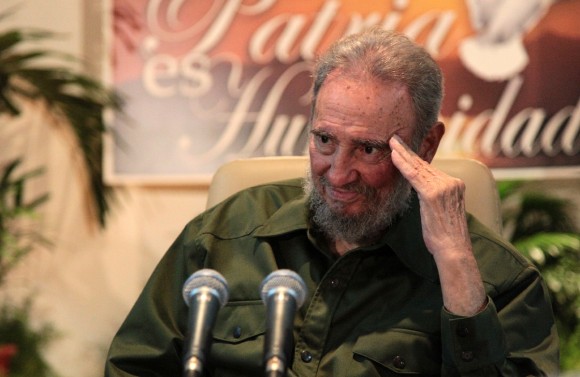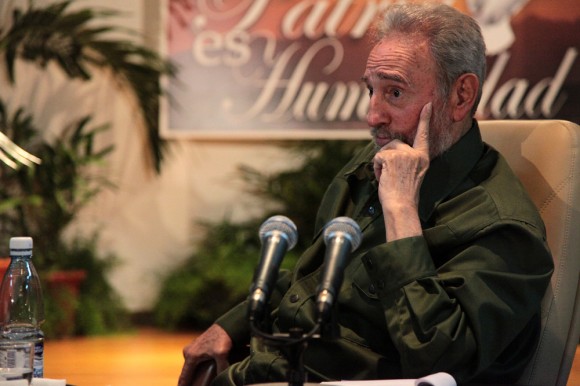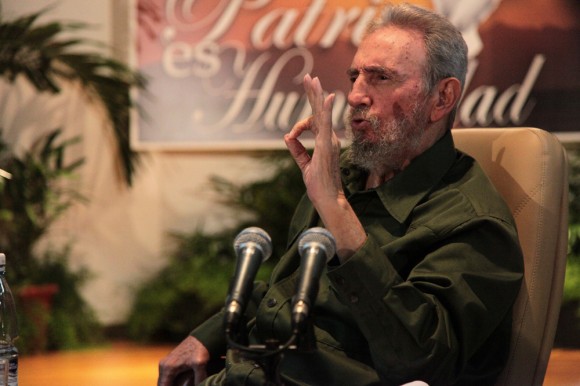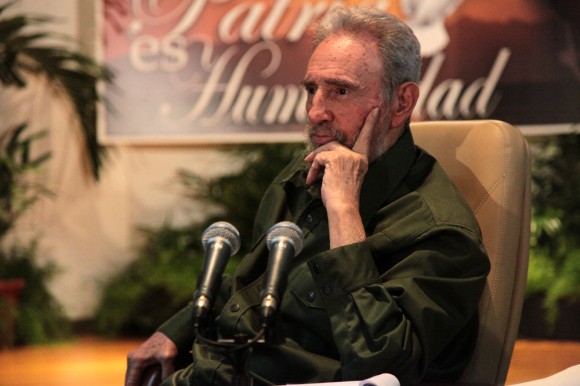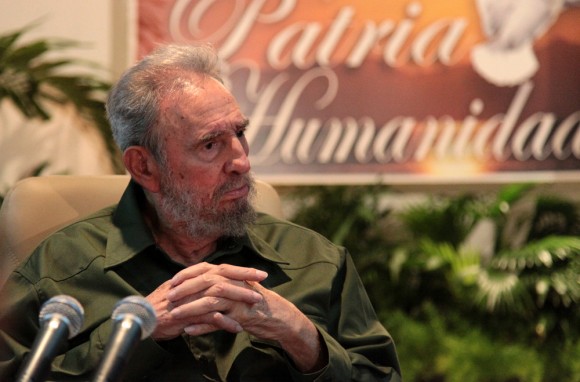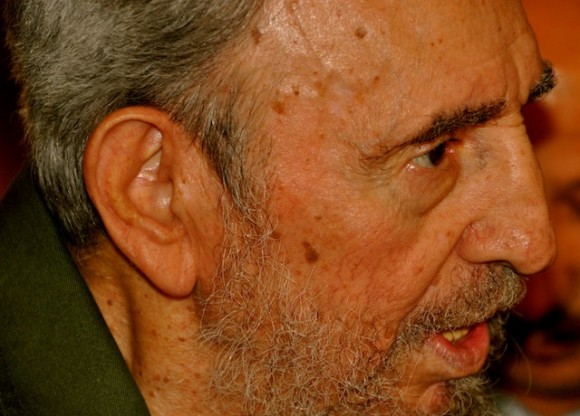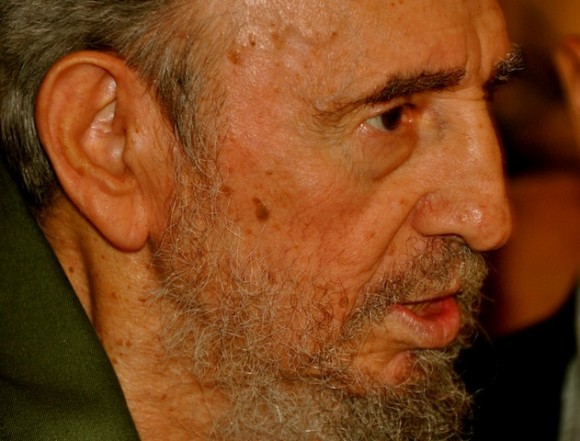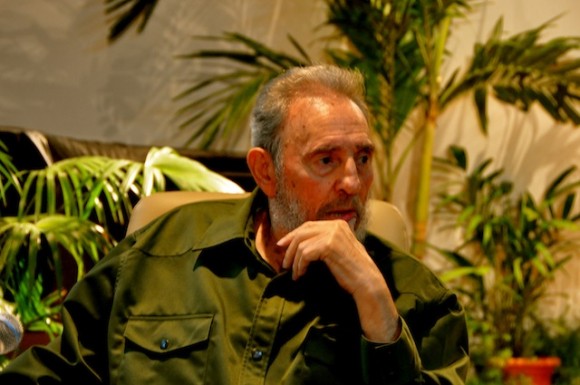
July 27th, 2010
Fidel: "We Should Try to be a Little Bit Better Each Day"
ROSA MIRIAM ELIZALDE
We waited in the small theater of the José Martí Memorial. We knew he was outside, laying, with as much privacy as possible, a wreath to the National Hero, next to the monument in the square. "It’s July 26, it’s not just any tribute," someone notes almost in a whisper so as not to break the silence of the room where we waited, several dozen people sensing his proximity. A second later his voice is heard at the door. It is Fidel.
So many well-known people!", he says, moving down the hall, waving to those in the seats nearby. "There is Rosa Miriam," he says to Marina Menendez, the deputy director of Juventud Rebelde, who was sitting next to me. "You know, one day, she asked me if we would survive the Special Period?", he laughs and squeezed my hand tightly. Unbelievable. He remembers one afternoon in late 1990, that I’d almost forgotten. I had just graduated and by chance I had to report an event at the Genetic Engineering and Biotechnology Center, and Fidel arrived. As if we were riding in a time machine, that day we literally watched the movie of what the Cubans would live through in the coming years of the special period, after the fall of the USSR. I was so shocked that when I was in front of him the only thing I could think to ask was: "Do you really believe that we might survive?".
Fidel walked on. He greeted relatives of Commander of the Revolution Juan Almeida, the Rev. Lucius Walker, members of the Pastors for Peace Caravan, the Rev. Raul Suarez. Also Silvio Rodriguez, Amaury Pérez, Sara Gonzalez, Frank Fernández, Vicente Feliu, the painters Nelson Domínguez, Kcho, Zaida del Rio, Rancaño, Flora Fong …. joking with some, thanking others.¼ He came in his olive green. Then he sat at the front of the auditorium, next to a small table waiting for some folders. Randy Alonso, director of Cuban television program, Mesa Redonda, moderated the exchange of questions and comments, beginning with Alexis Leyva Machado (Kcho).
HE ALSO TALKED WITH THE FAMILY OF COMMANDER OF THE REVOLUTION JUAN ALMEIDA.
He brought two flags, one of July 26, which Commander of the Revolution Juan Almeida gave the artist, and which accompanied the "Marta Machado" artistic Brigade, organized by Kcho and a group made up of prominent Cuban artists who attended to the victims of the terrible hurricanes that struck Cuba in 2008, and also to the victims of the earthquake on Jan. 12 in Haiti. Immediately, a flagpole appeared and the flag was raised, alongside the national flag, in the left wing of the Theatre.
Fidel warmed up and talked about the events of Moncada, exactly 57 years ago: "I've said it before and I repeat, if I had to do it again, I would do everything the same, except paying attention to the Cossack Post. I had to go on….If I had carried on these people would not have shot at those in the post, and I would not have given in to the temptation to take those two machine guns, which was due to our shortage of weapons."
"There were enough men," he reaffirmed. "I would say no more were needed. We had about three times more men than it needed to take that goal. I am convinced of that."
INSPIRATION
The Rev. Raul Suarez, who heads the Martin Luther King Center, asked the Commander in Chief for a reflection. "For us it was not easy to live our faith and practice our vocation in a socialist-revolutionary process. We had been instilled to the core American anti-communist ideology…. What we really fell in love with of the Revolution and sharing this process with our people was what motivated you to go to Moncada. I would like a few words from you… At this time in our country we badly need ethical moral and spiritual sustain to do everything we have to do ¼ …. "ended Raul.
THE LEADER OF THE REVOLUTION GREETS THE REVEREND LUCIUS WALKER.
Fidel had listened to him carefully: "Really all we had," he said, "was inspiration. One cannot explain what would have happened to Silvio and everyone here, without inspiration. One should aim, almost as a rule, to be each day a little bit better. And do not give up that line….."
For everything else you can find explanations and each of these are legitimate, the Commander in Chief went on to say, acknowledging that there is no contradiction between the believers and the Revolution, as the Brazilian father Frei Betto said in the conversation that was later inserted in the book ‘Fidel and Religion’. He admits that "science permeates and penetrates and goes to incredible limits. We are less than dust, and that we know from science."
"What did man know 200 years ago?" And he recalled the "Prayer to God," by the poet Gabriel de la Concepción Valdés "Plácido" (1809-1844), where he talks of the "heliacal star" and that Mary, the mother of Christ, ‘bore the pain’. "That always struck me, because he knew that there was helium in the stars. But nothing more than that. Not much more. What happened to knowledge? They have erupted. Fifty years ago, at the Moncada, we knew nothing,.¼ And since then, in a few years, science has advanced so much ….All these devices, all these cameras, blackberry ... that anyone has ¼ ¼ "he smiled
"I am not a fortune teller, he continued," I am not a prophet. But I see things logically and we must see them with a bit of serenity and be prepared. Our people are prepared now to see them. And see the dangers. It would be terrible if we were to face problems that we hadn’t thought of, "he concluded.
IRAN, NORTH KOREA AND BRITISH PETROLEUM
These concerns, Fidel added, led him to write the latest Reflections on the terrible situation that has been brewing in the Middle East, which began with an article entitled "The Empire and war", published on June 1 after Israel's attack on an humanitarian fleet bound for Gaza, which asks: "Could Obama enjoy the emotions of a second presidential election without the Pentagon or the State of Israel, whose behavior does not follow the U.S. decisions at all, in using their nuclear weapons on Iran? What would life on our planet be like after that? ".
Leaving the pages of his Reflections on the table he said: "And that is starting to appear in Korea and I think that the conflict could be unleashed there. They made people believe that North Korea had sunk the ship (Cheonan). With an old Soviet submarine, which makes a tremendous noise and can be heard almost without equipment ….And fires a torpedo. And half of the world believes that, yes, the North Koreans sank the ship ¼ ,
He did not invent this information. Fidel cited an article by Global Research which had "truly amazing details of what happened." When the situation started to worsen, the leader of the Revolution would share his findings systematically, born in the heat of the daily news in Asia and the Middle East, and warnings that important specialists were revealing, until he discerned "the inevitable war", the title of his reflection on 16 June.
On June 24 he published "How I wish I was wrong." "It’s funny," he paused and looked at the audience: "I was wrong, but in another way," and claimed the need to be prepared for a tragedy that can be daunting, if they use the vast nuclear arsenal that is in the hands of the superpowers today against Iran and North Korea.
To demonstrate how this is possible he recalls that years ago the United States, in time of Nixon, threatened to use tactical nuclear weapons against Vietnam and Korea. However, "with that comes the problem of the oil leak…. BP is drilling for oil at great depths, with modern technology, to 8,000 meters, which is where the leak is," and adds: "Today 107 days after the leak occurred, it has not yet been resolved. And (Barack) Obama knows, but he does not admit publicly that it is a great danger.. "
The Commander in Chief said that this is not a hopeless situation: "What chance that the company was looking for oil!" he said, recalling the role of BP in the coup against Mossadegh in Iran. "Who would have thought of that? It is not the first time something like this has happened. There have been other disasters, with ships from Alaska…. But even Bush did not dare to authorize the drilling. However, Obama authorized the British to drill¼ because he believes blindly in technology."
What if British Petroleum hadn’t caused this accident? "They would have carried on drilling….. they have 27,000 unproductive wells, and the concern of government, is textual, ¼ that gas begins to seep from the non-productive wells. And there is no solution to this disaster. That is why they have not talked again about this matter, after they said it had been resolved. "
This is the subject matter of the Reflection of Fidel on August 3: "I have all the data, but I'm waiting for what they say today and what they will say tomorrow…. but you will see, don’t get impatient. I just ask you to trust me."
He announced that he will also call for a special session of the National Assembly to discuss such important matters.
Irma Shelton, a journalist with the Information System of Television Cubana, asked Fidel to comment on the situation no less critical in Latin America, with the U.S. military deployment in Costa Rica, approved by the parliament and the presidency of that country, to which can be added military exercises in Peru and the breaking of relations between Venezuela and Colombia. "All those things," he said, "reveal the irresponsibility of the Empire. They do not control, they cannot control their instincts. I say it seriously, they belong to prehistory." And ironically he said: "That's all inspired by the 'noblest' of purposes: fighting drugs.."
Later singer Amaury Perez asked, "There are forces supporting President Obama that have the impression that he was ill advised to authorize British Petroleum to drill the deeper hole, that this disaster was calculated by these right-wing forces that are against Obama to not triggering his re-election for another term. Have you ever thought that this could be a possibility too? ".
Fidel touched his forehead with his left hand for a second and responded, "It seems to me difficult that anyone might advise that, in order to spite the other. What they can do is taking up any little thing to attack him…. But it doesn’t seem to me that they have led the man to make a mistake so that they could attack him. No.. "
He added: "The problem with Obama is his obsession that U.S. be independent of oil imports. It has the highest per capita consumption of oil and gas in the world. And it is seeking not rely on oil from Venezuela, Iran and the Middle East. They have put that company in Saudi Arabia, which is producing 10 million barrels a day, and has the capacity to produce 20 millions a day. Do you know what can happen to the environment? ".
He talked of the dramatic predictions that the film Home, directed by Yann Arthus-Bertrand, raises and asked "But is renewable energy a dream? They have already made the first trial flight with a small plane that weighs 60 kilograms… the first time it flew for over ten hours with solar energy. In the new trial it could fly for 33 days. No one knows what you can do harnessing the power of the sea, rivers, methods to make rain in times of drought. ¼ there are many ways in which science can help.. "
STRATEGIC VICTORY
He put forward some ideas he would express this Tuesday, July 27, in a reflection dedicated to "the strategic victory", which takes up again the military conception of the Rebel Army during the last moments of the offensive against Batista, where they did not commit the errors that prevented the taking of the Moncada Barracks in 1953, and the revolutionaries were able to withstand 10,000 men who had the support of the Navy, Air Force, under constant bombardment. He announces a forthcoming book, on which he has worked with researcher Katiuska Blanco.
The Rev. Lucius Walker, leader of the Pastors for Peace, asked about the future of Haiti. Fidel responded without hesitation, "In today's world, there is no solution there. In the future I am talking about, yes. (USA) is a major producer of food, it produces for two billion people. It has the capacity to build houses to withstand earthquakes. The problem is how the resources are distributed….. This country (Haiti) needs to plant again its forests. But it has no solution in the current world order.. "¼ .
He recalled the U.S. selfishness and callousness faced with the millions of hungry and in need of healthcare, particularly children. Also, the blockade that Cuba is suffering and the unjust imprisonment of the five Cuban anti-terrorists in U.S. prisons, who are serving long sentences. "They have not made the slightest gesture to release them. Five people separated from their families… And they will have to release them."
He talked, quite moved, about his visit to Artemisa. We were looking on the Round Table at stories related to Moncada. "I discovered the value of music (which ran in the background). Colossal. Fabulous. Vitier's music. It's something I can never forget. Nobody knows what it's worth. Is an infinite satisfaction. I do not want to stop paying tribute to the men whose gift to humanity is through their music."
Applause. Fidel walked back down the hallway to leave the José Martí Memorial Theatre. Again, the hugs, greetings, a small comment here and there. When he passed near my chair, he paused for a moment: "See, my daughter, how we were able to resist."
http://www.facebook.com/album.php?aid=237747&id=244543016928

- Cubadebate - http://cuba.cubadebate.cu
-
http://www.cubadebate.cu/noticias/2010/07/26/fidel-
deberiamos-proponernos-cada-dia-ser-poquitico-mejores/
Fidel:
“Deberíamos proponernos cada día ser
aunque sea un poquitico mejores” (+ Fotos y Videos)
Publicado el 26 Julio 2010 en Especiales, Noticias, Rosa Miriam Elizalde
Con fotos de Silvio Rodríguez y de Petí
Esperamos en el pequeño teatro del Memorial José Martí. Sabemos que él está afuera, colocando en la mayor intimidad posible una ofrenda floral al Héroe Nacional, junto al monumento de la Plaza. “Es 26 de Julio, no es un homenaje cualquiera”, hace notar alguien casi en un susurro para no romper el silencio del salón donde lo esperamos varias decenas de personas que intuimos su proximidad. Un segundo después se escucha su voz en la puerta. Es Fidel.
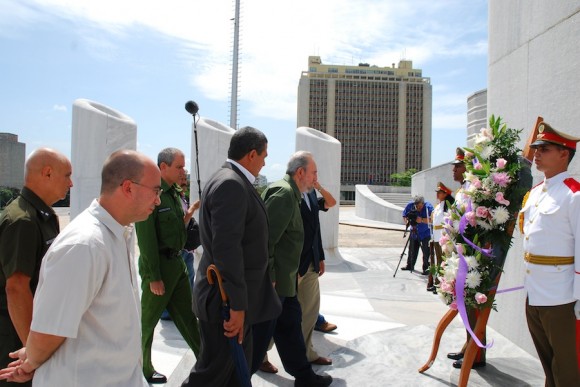
Fidel rinde homenaje a José Martí. Foto: Estudios Revolución
“¡Cuánta gente conocida!”, dice y avanza por el pasillo, saludando a quienes están en los asientos cercanos. “Ahí está Rosa Miriam”, le dice a Marina Menéndez, subdirectora del diario Juventud Rebelde, que se sienta a mi lado. “¿Sabes que ella un día me preguntó si íbamos a sobrevivir el Período Especial?”, se ríe y me aprieta con fuerza la mano. Increíble. Recuerda una tarde cualquiera de fines de 1990 que ya casi no alcanza mi memoria. Yo acababa de graduarme y por pura casualidad me tocó reportar un acto en el Centro de Ingeniería y Biotecnología, al que llegó Fidel. Como si nos montara en una máquina del tiempo, ese día nos pasó literalmente la película de lo que viviríamos los cubanos en los próximos años de Período Especial, tras la desaparición de la URSS. Me quedé tan consternada que cuando lo tuve delante lo único que se me ocurrió preguntarle fue: “¿Usted cree realmente que sobreviviremos?”
Fidel avanza. Saluda a familiares del Comandante Juan Almeida, al reverendo Lucius Walker, a integrantes de la Caravana Pastores por la Paz, al reverendo Raúl Suárez. También, a Silvio Rodríguez, Amaury Pérez, Sara González, Frank Fernández, Vicente Feliú, los pintores Nelson Domínguez, Kcho, Choco, Zaida del Río, Rancaño, Flora Fong …. Bromea con unos, agradece a otros. Va de verdeolivo. Ya está sentado frente al auditorio, junto a una mesita sobre la que aguardan unas carpeta. Randy Alonso, el director del programa de la Televisión Cubana, Mesa Redonda, modera el intercambio de preguntas y comentarios, que comienza con Alexis Leyva Machado (Kcho).
Él trae dos banderas, una de ellas la del 26 de Julio, que le entregó al artista el Comandante Juan Almeida y acompañó a la Brigada artística “Marta Machado”, organizada por Kcho e integrada por un grupo de notables artistas cubanos, que han asistido a los damnificados de los terribles huracanes que asolaron a Cuba en el 2008 y también, a las víctimas del terremoto del 12 de enero pasado en Haití. Inmediatamente, aparece un asta y la bandera ocupa, junto a la enseña nacional, el ala izquierda del Teatro.
Fidel se anima y comenta sobre los sucesos del Moncada, hace exactamente 57 años: “Lo he dicho y lo repito, si tengo que hacerlo otra vez, lo haría todo igual, excepto prestarle atención a la Posta cosaca. Debí seguir… Si yo sigo, aquella gente no dispara sobre los que están en la posta, y yo no me habría dejado llevar por la tentación de tomar aquellas dos ametralladoras, que era consecuencia de la escasez de armas”.
“Éramos suficientes hombres”, reafirma. “Yo diría que no hacía falta más. Llevábamos como tres veces más hombres de los que hacía falta para tomar aquel objetivo. Estoy convencido de eso.”
INSPIRACIÓN
El reverendo Raúl Suárez, quien dirige el Centro Martin Luther King, le pide al Comandante en Jefe una reflexión. “Para nosotros no fue fácil vivir nuestra fe y practicar nuestra vocación en un proceso revolucionario de tipo socialista. Se nos había introducido hasta los tuétanos la ideología norteamericana anticomunista… Lo que realmente nos enamoró de la Revolución y compartir con nuestro pueblo este proceso, fue lo que los motivó a ustedes a ir al Moncada. Yo quisiera de usted unas palabras… En estos momentos que vive nuestro país es muy importante el sustento ético, moral, espiritual para todo lo que tenemos que hacer…”, termina Raúl.
Fidel lo ha escuchado con atención: “Realmente lo único que teníamos era eso -dice-: inspiración. Uno no puede explicarse lo que le ha pasado a Silvio y a todos aquí, sin inspiración. Uno debería proponerse, casi como una norma, ser cada día aunque sea un poquitico mejor. Y no abandonar esa línea…”.
A todo lo demás se le puede buscar explicaciones y cada una de estas son legítimas, apunta el Comandante en Jefe, reconociendo que no hay contradicción entre los creyentes y la Revolución, como le comentaba al padre brasileño Frei Betto en la conversación que luego integraría el libro Fidel y la Religión. Admite que la “ciencia penetra y penetra y llega a límites increíbles. Somos menos que polvo, y eso lo sabemos por la ciencia”.
“¿Qué sabía el hombre hace 200 años?”, y recuerda la “Plegaria a Dios”, del poeta Gabriel de la Concepción Valdés “Plácido” (1809-1844), donde habla de la “helíaca estrella” y que María “soportó el dolor” -la madre de Cristo-. “Eso siempre me llamó la atención, porque ya él sabía que había helio en las estrellas. Pero nada más que eso. No mucho más. ¿Y qué ha pasado con los conocimientos? Han estallado. Hace 50 años, cuando el Moncada, no sabíamos nada… Y desde entonces, en unos pocos años, cuánto ha avanzado la Ciencia… Todos esos aparaticos, todas esas cámaras, los blackberry... que los tiene ya cualquiera por ahí…”, sonríe.
“Yo no soy adivino -prosigue-, ni soy profeta. Sino que veo las cosas, con lógica y debemos verlas con un poquito de serenidad y estar preparados. Nuestro pueblo está preparado hoy para verlo. Y ver los peligros. Lo terrible sería que nos enfrentemos a problemas que no nos hayan pasado por la mente”, concluye.
IRÁN, COREA DEL NORTE Y BRITISH PETROLEUM
Estas inquietudes, añade Fidel, lo llevaron a escribir las más recientes Reflexiones sobre la terrible situación que se ha estado gestando en el Oriente Medio, que comenzó con el artículo titulado “El Imperio y la guerra”, publicado el 1 de junio, después del ataque de Israel a la flotilla humanitaria que se dirigía a Gaza, y en el que se pregunta: “¿podrá Obama disfrutar las emociones de una segunda elección presidencial sin que el Pentágono o el Estado de Israel, que en su comportamiento no acata en nada las decisiones de Estados Unidos, utilicen sus armas nucleares en Irán? ¿Cómo será la vida en nuestro planeta después de eso?”
Deja las páginas de sus Reflexiones sobre la mesa y comenta: “Y en eso empieza a aparecer Corea y pienso que el conflicto se va a desatar por ahí. Hicieron creer que Corea del Norte había hundido el barco (Cheonan). Con un submarino viejo, soviético, que hace un ruido tremendo y casi se oye sin aparatos… Y dispara un torpedo. Y le han hecho creer eso a la mitad del mundo que sí, que los coreanos del Norte hundieron el buque…”
No inventó esa información. Fidel cita un artículo de Global Research que presenta “los detalles verdaderamente asombroso de lo que ocurrió”. Cuando empieza a agravarse la situación, el líder de la Revolución va compartiendo sistemáticamente sus apreciaciones, nacidas en el fragor de las noticias diarias en Asia y el Oriente Medio, y de las alertas que van develando importantes especialistas, hasta que vislumbra “la contienda inevitable”, título de su Reflexión del 16 de junio.
El 24 de junio publica “Cómo me gustaría estar equivocado”. “Es curioso -hace una pausa y mira a la audiencia-: estaba equivocado, pero de otra forma”, y reivindica la necesidad de estar preparados para una tragedia que puede ser de enormes proporciones, si se utiliza el inmenso arsenal nuclear que hoy está en manos de las superpotencias contra Irán y Corea del Norte.
Para demostrar que esto es posible recuerda que Estados Unidos ya amenazó en época de Nixon con utilizar las armas nucleares tácticas contra Vietnam y Corea, hace años. Sin embargo, “en eso viene el problema del derrame de petróleo… Se aparece BP buscando petróleo a grandes profundidades, con la tecnología moderna, a 8 mil metros, que es donde se produce el derrame”, y añade: “hoy hace 107 días desde que se produjo el derrame, que no han podido resolver. Y (Barack) Obama sabe, pero públicamente no acepta que es un peligro muy grande.”
El Comandante en Jefe asegura que esta no es una situación sin remedio: “¡Qué casualidad que estuviera esta empresa buscando petróleo!”, dice recordando el papel de BP en el golpe de Estado contra Mossadegh en Irán. “¿Quién lo iba a pensar? No es la primera vez que algo así sucede. Han ocurrido otros desastres, con barcos que venían de Alaska… Pero ni Bush se atrevió a autorizar estas perforaciones. Sin embargo, Obama autorizo a la British que perforara, porque cree ciegamente en la tecnología.”
¿Y si no se llega a producir este accidente de la British Petroleum? “Hubieran seguido perforando… Tienen 27 mil pozos no productivos, y la preocupación del gobierno -está textual-, es que comience a salir gas por los pozos no productivos. Y no tenga solución este desastre. Por eso no han vuelto hablar del asunto, después que dijeron que lo habían resuelto”.
Este es el tema que tratará Fidel en la Reflexión del próximo 3 de agosto: “Tengo todos los datos, pero estoy esperando por lo que digan hoy y lo que dirán mañana… Pero ustedes la verán, no se impacienten. Yo solo les pido que confíen.”
Anuncia que también solicitará una sesión extraordinaria de la Asamblea Nacional para hablar sobre tan importantes asuntos.
Irma Shelton, periodista del Sistema Informativo de la Televisión Cubana, pide a Fidel que comente acerca de la situación no menos crítica de América Latina, con el despliegue militar norteamericano en Costa Rica, autorizado por el Parlamento y la Presidencia de ese país, a lo que se añaden maniobras militares en Perú y rompimiento de relaciones entre Venezuela y Colombia. “Todas esas cosas -afirma- demuestran el nivel de irresponsabilidad del Imperio. No controlan, no pueden controlar sus instintos. En serio digo: pertenecen a la prehistoria”. E ironiza: “Todo eso inspirado en propósitos muy ‘nobles’: combatir las drogas.”
Después el cantautor Amaury Pérez pregunta: “Hay fuerzas simpatizantes del Presidente Obama que tenían la impresión de que fue mal asesorado para que autorizara a British Petroleum a que hiciera el pozo más hondo, para que ese desastre calculado por esas fuerzas de derecha que están en contra de Obama, provocaran su no reelección para un nuevo período. ¿Usted ha pensado en que esa sea una posibilidad también?”
Fidel se toca la frente con la mano izquierda un segundo y responde: ”A mí me parece difícil que alguien haya elucubrado tanto para aconsejar eso, con el fin de fastidiar al otro. Lo que pueden hacer es aprovechar siempre cualquier cosita para atacarlo… Pero no me parece que hayan propiciado que el hombre caiga en un error de esos para atacarlo. No.”
Y añade: “El problema de Obama es la obsesión de que Estados Unidos sea independiente de la importación de petróleo. Es el consumo más alto per cápita de petróleo y de gas en el mundo. Y está buscando no depender del petróleo de Venezuela, de Irán o del Medio Oriente. Han puesto la empresa esa en Arabia Saudita, que está produciendo 10 millones de barriles diarios, y que tiene la capacidad de producir 20 millones diarios. ¿Tú sabes lo que puede pasar con el medio ambiente?”
Habla de los dramáticos vaticinios que plantea el documental Home, dirigido por Yann Arthus-Bertrand, y se pregunta: “¿Pero acaso la energía renovable es un sueño? Ya hicieron la primera prueba con un avioncito que pesa 60 kilogramos… La primera vez voló por más de diez horas con energía solar. En la nueva prueba, pudo volar 33 días. Ni se sabe lo que puede hacer aprovechando la energía del mar, los ríos, métodos para hacer llover en tiempo de sequía… Hay muchas formas en que la Ciencia puede ayudar.”
LA VICTORIA ESTRATEGICA
Adelanta algunas ideas que expresará este martes, 27 de julio, en una Reflexión dedicada a “la victoria estratégica”, que retoma la concepción militar del Ejército Rebelde durante los últimos momentos de la ofensiva contra Batista, donde no se cometieron los errores que impidieron la toma del Cuartel Moncada en 1953 y los revolucionarios lograron resistir a 10 000 hombres, con el apoyo de la Marina, la Aviación, bajo permanente bombardeo. Anuncia un libro en preparación, donde ha trabajado con la investigadora Katiuska Blanco.
El reverendo Lucius Walker, líder de los “Pastores por la Paz”, pregunta sobre el futuro de Haití. Fidel reacciona sin titubear: “En el mundo actual, no tiene solución ese país. En el futuro del que estoy hablando, sí. (EEUU) es un gran productor de alimentos, produce para dos mil millones de personas. Tendría capacidad para construir casas que resistan a los terremotos. El problema es la forma en que se distribuyen los recursos… A ese país (Haití) hay que plantarle otra vez su bosques. Pero no tiene solución en el orden actual del mundo.”
Recordó el egoísmo y la insensibilidad norteamericana frente a los millones de hambrientos y necesitados de atención de salud, particularmente los niños. También, el bloqueo que sufre Cuba y la injusta prisión de los Cinco Héroes antiterroristas en cárceles norteamericanas, víctimas de largas condenas. “No han tenido el menor gesto para ponerlos en libertad. Cinco seres humanos separados de sus familias… Y los van a tener que soltar.”
Comenta, conmovido, su encuentro en Artemisa. Estuvo viendo en la Mesa Redonda las historias vinculadas al Moncada. “Descubrí el valor de la música (que corría de fondo). Colosal. Fabulosa. La música de Vitier. Es algo que no podré olvidar jamás. Nadie sabe lo que vale eso. Es una satisfacción infinita. No quería dejar de rendirle tributo a los hombres que obsequian a la humanidad con su música.”
Aplausos. Fidel toma de vuelta el pasillo para salir del Teatro del Memorial José Martí. Nuevamente los abrazos, los saludos, un pequeño comentario aquí y allá. Cuando pasa cerca de mi silla, se detiene un instante: “Viste, mija, que se pudo resistir”.
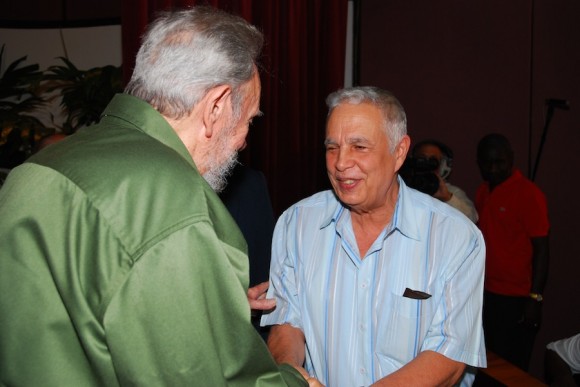
Fidel saluda a Rolando Alfonso Borges, Jefe del Departamento Ideológico del Comité Central. Foto: Estudios Revolución
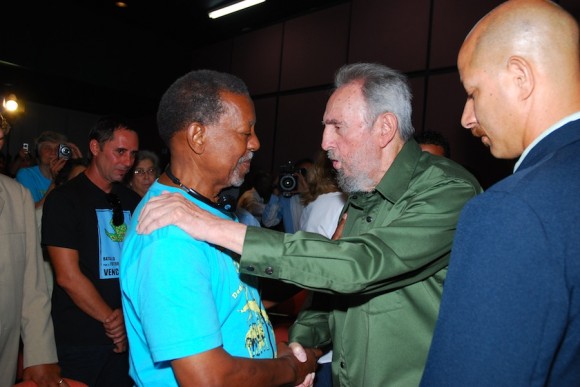
Fidel saluda a Lucius Walker, líder de los Pastores por la paz. Foto: Estudios Revolución
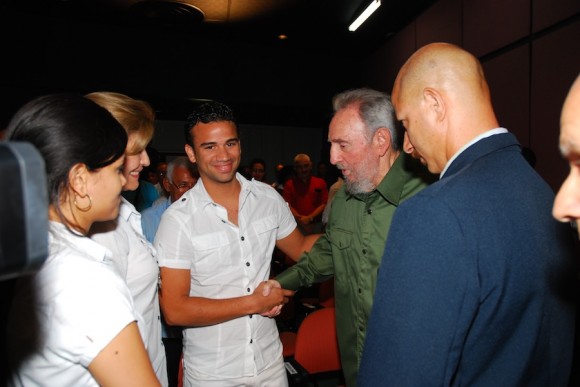
Saluda a familiares del Comandante Juan Almeida. Foto: Estudios Revolución
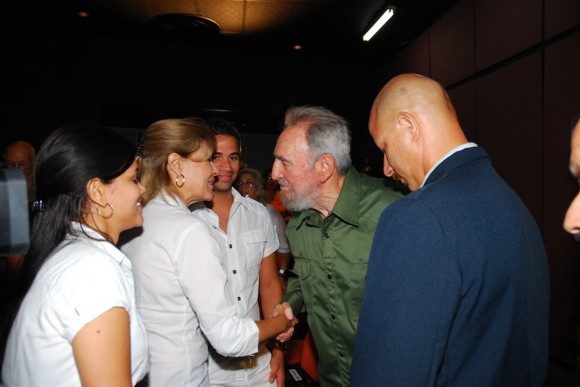
Fidel saluda a familiares del Comandante Juan Almeida. Foto: Estudios Revolución

Fidel saluda a Silvio Rodríguez y Amaury Pérez. Foto: Estudios Revolución
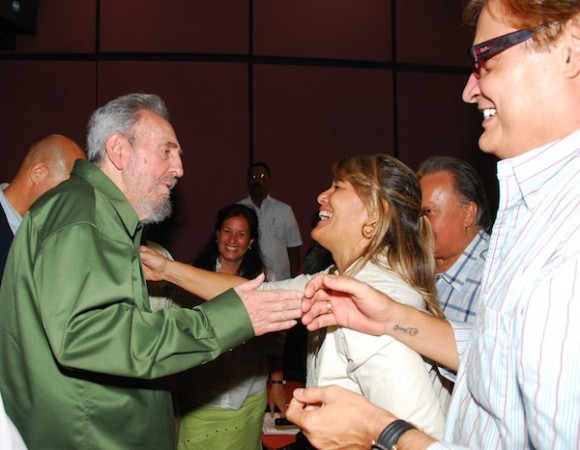
Fidel conversa con Petí y Amaury Pérez. Foto: Estudios Revolución
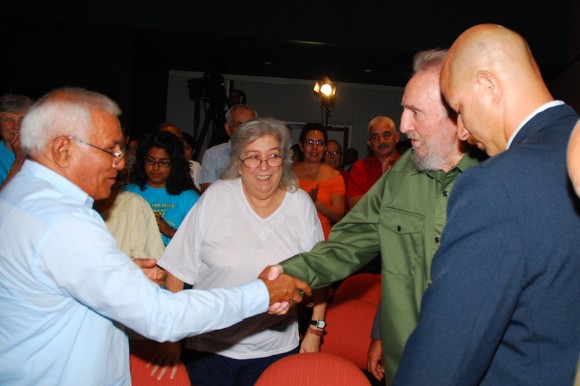
Reverendo Pablo Odén Marichal, diputado a la Asamblea Nacional del Poder Popular y secretario ejecutivo del Consejo de Iglesias de Cuba. Foto: Estudios Revolución
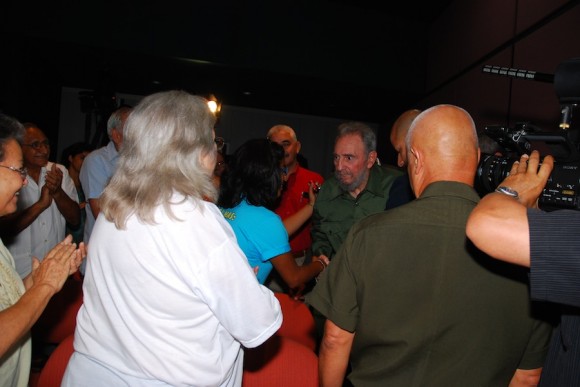
Fidel saluda a Sara González. Foto: Estudios Revolución
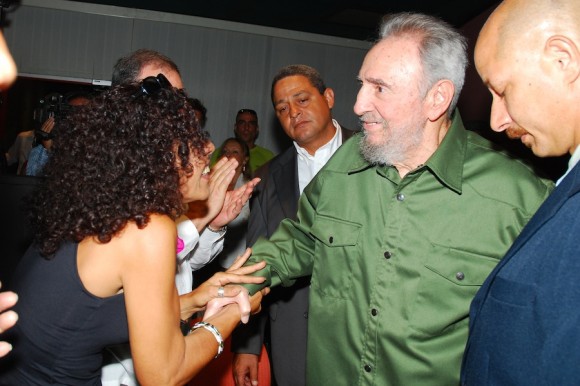
Fidel saluda a Marina Menéndez, subdirectora de Juventud Rebelde. Foto: Estudios Revolución
Fidel responde pregunta de Lucius Walker, líder de Pastores por la Paz

Fidel responde a Amaury Pérez

URL del artículo : http://cuba.cubadebate.cu/noticias/2010/07/26/fidel-deberiamos-proponernos-cada-dia-ser-poquitico-mejores/
Clic aquí para imprimir.
Cubadebate, Contra el Terrorismo Mediático http://www.cubadebate.cu
